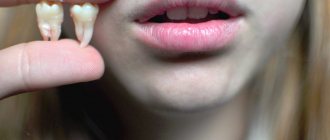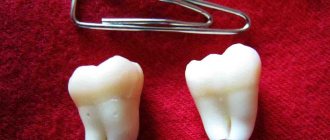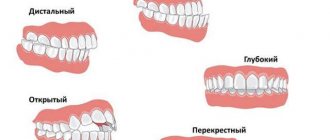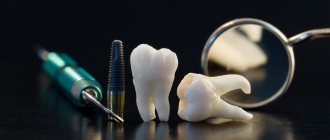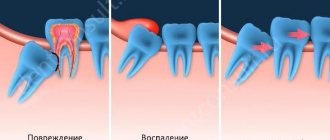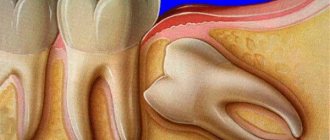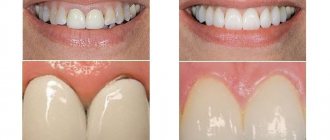/ Signs / Folk signs about wisdom teeth
0
3426
Article rating
The superstitions and traditions of the Old Believers were based on personal experience and sincere belief in certain events and phenomena. The wisdom tooth deserved special attention from the ancestors; the people have a large number of folk signs and beliefs associated with it.
Folk signs about wisdom teeth
What does a wisdom tooth mean according to signs?
Signs and superstitions even affected wisdom teeth (molars). The average age limit for their eruption is 18-27 years. One of the signs says: the sooner a girl’s molar begins to grow, the sooner she will get married, and the sooner the young man will find an activity that brings pleasure and prosperity. For a long time, people also paid attention to how problematic the process of eruption was - the worse the molar grew, the more negatively the signs were interpreted.
Attention! The best sign is when all 4 teeth erupt without complications.
The coming year promises good luck and prospects. The positive side of the sign is noted if one of the newlyweds has root incisors. The process of teeth growth has begun right on the eve of an important task - it will end with great success. But if the problem causes severe pain, gums become inflamed because of it, and health difficulties arise, then the signs are completely disappointing.
Determining character by teeth
Dental composition changes throughout life. In infancy, the first tooth, the baby incisors, appears, after which they fall out and are replaced by permanent teeth. The last tooth to appear is the wisdom tooth.
As a person develops and changes, so do his physiological and psychological characteristics. There are folk signs about wisdom teeth and other molars associated with character transformation:
- If the wisdom tooth is straight, the person’s character is stable. He always achieves the best results in business.
- If he is crooked, it is easy for a person to find a common language with others. He easily adapts to his environment, no matter where he is and whoever he has to contact.
- The upper molar grows first - life will pass in material prosperity, the lower one - success in your personal life will come.
- The first incisor is the upper one - the person’s spirit is strong, the lower one - his character is compliant.
Not only wisdom teeth are important, but also the formation of the canine, as well as the entire dental structure, consisting of 33 incisors. So, if the teeth are crooked and sparse, the person is characterized by instability of character. It is difficult for such a person to find his place in life. And if not all of a person’s molars have come out, he has a weak character.
Signs about when wisdom teeth begin and why they grow
Wisdom teeth have this name for the following reason: their growth begins in adulthood. Usually they grow gradually, one by one. It is noteworthy that the eruption of the lower root incisors can cause a lot of trouble, threatening not just a person’s health, but his life.
It happens when 4 wisdom teeth grow at once, this is an excellent sign, by the way, if the process was painless or did not cause harm to health. It is a good sign for young people if teeth begin to erupt early. It has long been believed that they will find a favorite activity or a companion for life.
Cases have a negative interpretation if a molar is broken, crumbled, bleeding, or when they are missing. This usually threatens illness, as well as discord with loved ones.
Signs about wisdom teeth - meaning, interpretation options
A person is born with a fully equipped set of teeth. The baby’s teeth, 28 in number, are formed in the mother’s womb, during the development of the fetus, and “sleep” until the time comes, hiding in the gums.
And only the last two pairs appear inside the gums only when the child is three or four years old. And they erupt even later - no earlier than fourteen. Signs and folk superstitions about the mysterious and unusual wisdom tooth (WT) are associated with such a special phenomenon.
By its behavior, when and how it appears, the future of its owner is judged.
Relic of the past
The human dentition consists of eight incisors, two pairs of canines and four pairs of chewing teeth - molars. In dentistry, third molars are called “third molars,” or, more simply, “eights.” They appear when children's baby teeth have completely fallen out and molars have grown in their place. These are not belated milk teeth - the teeth are permanent and have five roots.
Many scientists recognized ZM as an atavism, a relic of the distant past, when human ancestors had to chew hard food. The jaws of primitive people were more powerful and larger, so that the dentition on them was more spacious.
But over the millennia, the appearance of man has changed greatly, including the shape of the skull and jaws. This is why wisdom teeth often grow incorrectly among contemporaries, which causes many problems for their owners if they are not pulled out in time.
It happens that the “eights” do not appear at all. Science considers this a variant of the norm.
What does the absence of “eights” mean?
Folk superstitions about wisdom teeth challenge the opinion of science. They argue: if the “eights” did not appear, this should be interpreted as a sign of a break in a person’s connection with his ancestors. Such a person, according to popular belief, is cut off from the past.
Esotericists believe that a person with an “understaffed” dentition is energetically weak, and is more susceptible to the influence of other people’s negativity, and is vulnerable to the evil eye and damage.
It should be clarified that what has been said applies to those whose “eights” did not appear at all. If the ZM appeared, but was pulled out for medical reasons, this does not affect the energy of the individual.
However, in some cultures it is still generally accepted that only individuals with a complete set of teeth are provided with the protection of their ancestors. And in the event of the loss of at least one molar, no matter which one, the otherworldly protection weakens. Therefore, they are in no hurry to part with fallen or pulled out teeth - former owners carry them with them as talismans.
Is there a relationship with mental development of the individual?
The absence of "eights" does not make a person stupider. The name has a completely different meaning. Unlike mind and intellect, wisdom is something that is acquired by a person with experience. Since ZMs usually erupt when their owner is already an adult, it is believed that the person has already lived enough and gained experience, become wise, and not just smart or cunning.
Signs about erupting molars
It is believed that if a molar begins to cut, changes are coming in the life of its owner. The folk sign is quite logical, given that the process usually occurs at an age when the person is very active.
Most often, ZMs appear when their owner is about twenty.
Graduating from an educational institution, looking for a job, settling into a personal life, the birth of your first child - these are just a small part of what can happen at this time.
- The sooner a tooth appears from a girl’s gum, the sooner she will get married.
- The appearance of a figure eight in a woman during pregnancy is a good sign: the baby will be born extremely smart and will delight the mother with his intelligence.
- ZM began to cut himself just before the wedding - a sign that its owner should take a closer look at his future spouse. Perhaps he is driven not by feelings, but by self-interest.
- The tooth is cut before an important business event - to its successful completion.
- The G8 quickly came out of the woodwork - a sign that the protracted conflict would soon be resolved.
- If all four molars erupt in one year, this will be a very good time.
Why does it hurt so much
The process is often very painful. The reason is that, unlike all other teeth, teeth do not grow in holes where milk teeth have fallen out, but gradually break through the gums. Sometimes this requires several stages: for a while the molar stops growing, and months later it reminds itself again with toothache.
- The process is long and painful - a sign of health problems.
- Small teeth erupted with severe toothache - you should beware of betrayal of a loved one, betrayal.
- The tooth erupted with blood - the usual way of life will change greatly in the near future.
- The process is accompanied by severe toothache - a sign that its owner should prepare for very important events.
- If the gums are painful and inflamed, the meaning of the folk sign is difficulty in fulfilling your plans.
- It hurts in the morning - the day will be difficult. There will be many exhausting contacts with unpleasant interlocutors and employees.
- A couple of “eights” whined before going to bed - a good sign: you should expect promising acquaintances.
Signs associated with the loss of a molar
Usually, the loss of elements of the dentition is an unpleasant event. But there are exceptions to the rule: sometimes folk signs about wisdom teeth are quite favorable.
- If a pregnant woman’s breast tissue crumbles and has to be torn out, the baby will be born sick and weak.
- Enamel cracking is a sign that a person is torn by contradictions between his duty to his family and his own desires.
- To injure or break the ZM is a sign of illness.
- The ZM broke off under the gum - a symbol of deception, intrigue, betrayal. You should be careful of your surroundings.
- A healthy-looking tooth breaks unexpectedly - a harbinger that problems will arise very soon, literally out of nowhere, and they should be solved quickly.
- The ZM was not snatched, but knocked out in a fight or by accident - you should beware of problems with the law.
- Pulling out a deformed tooth is a favorable sign. Useful but lost contacts will be restored.
- The gums bleed after removal - a sign that a favorable moment has come to get rid of bad habits, parting with bad people who have become a burden.
Why do eights appear in reality and in dreams?
A belief that has an extremely negative meaning is the loss of earth. Popular superstitions interpret such events as a sign of a threat to health. And in this case, science is in full agreement with popular superstitions.
As already mentioned, third molars are molars. Therefore, unlike baby teeth, they cannot fall out on their own. The cause of the incident may be poor gum condition, severe and dangerous diseases: for example, advanced periodontal disease, scurvy.
But in a dream this often happens. If a wisdom tooth falls out, the sign says that the dreamer will experience loss. This could be unexpected financial expenses, a quarrel with someone close, separation from a loved one.
The worst thing is when the prolapse is accompanied by blood. This means that one of the blood relatives or very close people is facing illness or even death. Another possible interpretation of the dream is a warning about damage caused to the dreamer. Since ZM are connected with ancestors, it is believed that through them deceased relatives warn the descendant about danger.
What to do with a torn or fallen molar
Individuals who are far from superstitions calmly leave unnecessary things at the dentist. However, in most ancient cultures it was not customary to part with parts of one’s own body so frivolously. Even cut nails and hair were burned so that they would not fall to ill-wishers and would not become an attribute of black magic.
What to do with a pulled out wisdom tooth depends on whether the owner is superstitious. For example, gypsies always take torn out or knocked out treasures with them. After waiting for the full moon, they are “buried” in the cemetery. According to gypsy beliefs, it is believed that in less than six months, real wealth will arrive in exchange for a worthily buried loss.
Slavic beliefs about the wisdom tooth prohibit keeping it at home and carrying it with you: it attracts bad luck. The best way to get rid of it is to throw it away at an intersection, throwing it over your left shoulder. Those for whom the action is unacceptable for some reason can burn or bury the tooth where people do not go.
Source: https://TaynoeZnanie.com/primety/o-zubah-mudrosti
Signs why wisdom teeth hurt
The growth of additional root incisors is often accompanied by painful sensations. No wonder, because the molar must cut through the gum. It is noted that the peak of pain in the morning warns of a difficult day ahead. Perhaps a superstitious person should be patient and try not to succumb to conflict situations.
Pain syndromes shortly before going to bed are interpreted completely differently. This means that the near future will be illuminated by a fateful meeting, although it is not specified which area of life it will affect.
Pain before bed prepares you for important events
In general, painful sensations mean that a series of important events will soon begin. In this case, severe pain, as well as redness of the gums, is interpreted as the presence of significant obstacles, but the superstitious will be able to overcome them. However, it happens that growing molars are small, but the pain from them is unbearable. This means that surrounded by a superstitious person there is an ill-wisher who is capable of betraying.
Customs for the loss of the first milk teeth
Different countries had their own signs and ways of getting rid of the first teeth that fell out. The majority performed the ritual with all the dental units that left the baby at the age of 6-14:
- in England, parents resorted to burning teeth so that magicians would not use them for their witchcraft purposes;
- in Rus', children turned to the brownie and the mouse, throwing a tooth behind their back and asking them to bring a “bone” tooth instead of a “burdock” one;
- the Romals made a conspiracy for wealth and long life for the baby by throwing a tooth to the moon;
- In Asian countries, the top tooth that fell out was thrown onto the roof, and the bottom one was placed under the floor.
Common Beliefs
Signs came from antiquity, and almost all nations have them.
It is believed that if a tooth is lost or thrown away, this promises the child an early departure from the parents’ home or life outside the homeland. In England they believed that a tooth not set on fire prophesies the appearance of dog fangs in a baby. In Rus', a child had to “give his milk tooth to the mouse”, replacing it with a new one. Mothers believed that this also accelerates the growth of other indigenous elements. In some European countries, it was long believed that after death the soul cannot rest until it finds its milk teeth. Their parents prudently burned them so that they would wait for their owner in the next world. This ritual also protected children from the evil eye and bad thoughts.
There are other folk beliefs regarding the teeth of both adults and children. The signs about wisdom teeth, which have always been attributed with unique properties, deserve special attention: if they are present, good luck will not leave a person, wealth and achievement of heights in career and love await him. The owner of a smile with 32 “pearls” could count on the help of his ancestors - they would never leave a relative, providing support in any matter. Previously, the question of why wisdom teeth grow had a simple answer - a person uses 100% of his mental abilities. The presence of all four "wise" units was considered a sign of a strong spirit. Some defects also spoke volumes:
Where should I put the tooth and can it be stored?
Many mothers are sentimental about such things, putting the first ultrasound picture, a tag from the maternity hospital, or a lock of hair in a box. If a tooth has left its owner, parents often do not know what to do with it. Just throwing it away is too simple and at the same time difficult, because changing the first tooth is a whole event. The items that fall out are most often placed under the pillow, and when the child falls asleep, they are replaced with a small gift, candy. Although this is not very convenient, since the baby can push the tooth into the corner of the bed, and it will be difficult to find it.
Is it possible to store a lost tooth? Certainly! An interesting fact is that the latest scientific discoveries condemn the immediate disposal of freshly plucked milk elements. British scientists have learned to extract stem cells from pulp, and the frozen material is stored for about 30 years and can be used to treat serious diseases.
Myths about the tooth fairy
The tooth fairy, invented by the writer Luis Coloma, has deeply entered the culture of Western countries and solved the question of parents about where to put their child’s teeth. Children like the deal with the fairy - it is entertaining and rewarding. Before going to bed, the child needs to put the fallen tooth under the pillow, and in the morning a gift or coin will appear in the bed instead. Parents, of course, must remember to make the substitution.
The myth of the tooth fairy is a useful one: it helps in overcoming the fear of a lost tooth, the child receives compensation for the pain experienced. Writer Vicky Lansky advises parents to tell their children that the fairy brings more gifts for a healthy tooth than for a damaged one. This motivates kids to maintain hygiene.
Many signs are associated with wisdom teeth. And, although this fact of its appearance is not recorded by everyone, everyone feels like an expert. The conversations surrounding the teething of a special root accessory are so interesting and rich.
Many signs are associated with wisdom teeth
Long ago, thousands of years ago, it gave a person authority among his fellow tribesmen. He was proud and emphasized the extraordinary mind and majesty of a person. Possessing the main feature that classifies the owner as a leading caste was important for the ancient inhabitant.
This is where the main sign was born. A growing wisdom tooth supposedly signifies serious changes in life.
Signs why wisdom teeth bleed
When the gums begin to bleed during the eruption of additional root incisors, this has both physiological and esoteric signals. In the first case, it is recommended to see a doctor immediately; you may have to undergo surgery to remove the disturbing tooth. Superstitions claim that such an event marks the receipt of news that will require decisive action, which, in turn, will force a change in the usual way of life.
Attention! The removal of a wisdom tooth is also marked by signs.
No matter how bad interpretations are shrouded in signs of sick, bleeding dental problems, their removal is not only a good solution for the physiological component. It also removes moral barriers, esoteric negative omens. It is noteworthy that the removal of problematic “wise” incisors should be done as quickly as possible, this will help avoid health complications, and the spiritual life of the superstitious will become easier.
Wisdom is not determined by the number of teeth
Many signs are associated with wisdom teeth.
And, although this fact of its appearance is not recorded by everyone, everyone feels like an expert. The conversations surrounding the teething of a special root accessory are so interesting and rich. Many signs are associated with wisdom teeth
Long ago, thousands of years ago, it gave a person authority among his fellow tribesmen. He was proud and emphasized the extraordinary mind and majesty of a person. Possessing the main feature that classifies the owner as a leading caste was important for the ancient inhabitant.
This is where the main sign was born. A growing wisdom tooth supposedly signifies serious changes in life.
Signs of why a wisdom tooth breaks
For a so-called molar (6-8 teeth) of a healthy adult to break, there must be serious reasons. If there are none, it means that the Universe is trying to warn about impending trouble. If you don’t get rid of it in time, or even worse, keep it, the superstitious person will involuntarily notice that difficulties await him everywhere. Communication with loved ones becomes more complicated, misunderstandings arise out of the blue, and meaningless arguments arise.
The moment when the incisor cracks directly under the gum, closer to the root, requires special attention. This means that a person suffering from an illness is too trusting and naive. This is especially true for new acquaintances, be they work partners or newly arrived neighbors.
One of the worst signs is if a tooth is broken
Other folk signs about him
Despite the fact that now they are trying to get rid of the “wise” eights as quickly as possible, in ancient times they tried to preserve them because our ancestors believed that its owner would be rich, successful and healthy. As for the pain that accompanies their appearance, it was believed that the stronger it is, the more good a wisdom tooth will bring to a person, and this will happen in the near future. Our ancestors even resorted to using spells to preserve such a valuable tooth. If for some reason it nevertheless fell out, then it was necessarily kept as a talisman.
Naturally, many signs were associated with this phenomenon. Below we will get acquainted with the most famous of them.
- If you string a lost wisdom tooth on a red string and constantly wear it around your neck, then love will soon come.
- If a tooth is pulled out by a dentist, then it should be stored in a special container in a secret place, then it will bring happiness.
- If a tooth was knocked out, then the person lost the protection of his guardian angel.
- If all four wisdom teeth appear at the same time, this means that a person will achieve great heights both in career and in love.
- If a wisdom tooth appeared in pain, then such a person was considered a wizard.
- If a wisdom tooth erupts in a pregnant woman, the baby will be born with high intelligence.
- If a tooth appears before the age of 18, then the person will face changes in life, and if after the specified time, then the person himself must radically change his life.
- The appearance of a wisdom tooth before the wedding means that you need to take a closer look at your other half. Perhaps he or she is pursuing mercantile goals.
- If it crumbles quickly, expect deception from friends or relatives.
As you may have noticed, opinions regarding wisdom teeth in ancient times and now vary greatly. Now people do not pay much attention to their appearance and try to get rid of them as quickly as possible. Whether or not to believe in the signs associated with the appearance of wisdom teeth is a personal matter. The main thing is that their presence does not lead to discomfort and pain.
Signs if a wisdom tooth grows during pregnancy
It cannot be said unequivocally that molars come in at a strictly defined time over a certain number of days. Many eyewitnesses complained that the incisor began to grow, died down, and a month later erupted again, and this process in total could drag on for years.
If a woman is planning a child, she is often advised to first get her teeth in order, since sometimes their treatment requires medication, which is unacceptable either during pregnancy or during breastfeeding.
But if the molar nevertheless began to erupt during such a significant period, the Universe suggests that the future baby will be smart and gifted. It’s not good if the incisor crumbles, breaks, or brings unpleasant sensations. It is believed that the child will be troublesome and capricious, which will carry over into his adult life.
Signs of worldly wisdom
There are few signs about wisdom teeth. The meaning of all postulates converges on one thing: distant or growing, they symbolize wisdom and everything connected with it.
Several examples can be given on this topic.
The eruption of “wise” teeth occurs if a person fully uses his abilities.
If the appearance of “eights” occurs during acute pain, good luck and prosperity are guaranteed for life. Especially in the year when they come out.
According to the gypsy superstition, if you bury such a tooth in a cemetery during the full moon, then prosperity will come to you within 6 months.
Removing a wisdom tooth means depriving yourself of the protection of higher powers
The pulled out tooth should be stored in a box in the far corner. It brings happiness.
Removing a wisdom tooth means depriving yourself of the protection of higher powers.
According to ancient beliefs, when a person develops four teeth, indicating the owner’s great spiritual experience, his authority among his relatives increases. His quality as the head of the clan, the elder, is not questioned, and his high status is strengthened.
And if someone had to acquire the 33rd tooth (the fifth “wise”) in severe pain, then he is none other than a powerful wizard.
Signs if a wisdom tooth comes out at age 40
If at the age of 40 a wisdom tooth is still missing, signs indicate that the person has a very complex character, which prevents normal communication with others and the establishment of relationships. It was believed that it would be difficult for such people to live life with a married partner and that problems in the labor sphere were possible. Since ancient times it has been said that the later the molar erupts, the more stupid and soulless a person is.
Attention! Wisdom teeth may not erupt at all.
Modern medicine does not see this as a problem, given that this state of affairs does not cause negative feelings in the patient. During a regular examination, it may turn out that the incisor is “on the way,” so sometimes the dentist “helps” unhindered growth by cutting into the gum. If the x-ray shows deviations, then usually the molar is removed or they wait until it begins to break through the gum.
It is noteworthy that signs associated the late growth of teeth with the fact that the superstitious was paying for the sins of their ancestors. On the other hand, such “late maturation” suggested that the person was too distant from family ties.
Disposal should be entrusted to a doctor
There is some truth in every story
The funniest story was the one that claims that if you remove wisdom teeth, your cheeks will not bulge, and your face will become more perfect.
Among other tales, there are those that say that wisdom teeth can take calcium from other teeth. And also that anomalies in the eruption of the eighth teeth can lead to crowding of teeth in the central group or even to the arrangement of the teeth of the upper jaw in the shape of a “fan”.
Of course, none of these tales are scientifically substantiated, although the latter may be genetic. But it’s true that such an anomaly can occur even without wisdom teeth.
So you shouldn’t believe in all the fables and, first of all, show the doctor what has grown there and find out what to do about it.
For example, that teething may be difficult. In such cases, the gums swell and are injured by the teeth that are nearby. The part that is located above the tooth that has not yet erupted (the hood) can accumulate pus. If this occurs in the lower jaw, the inflammation may affect the muscles that close the mouth. And then you won’t be able to open your mouth wide.
What to do in this case? Close your mouth and run to the dentist. Otherwise, if left too long, the wisdom tooth can cause fever, problems with swallowing, and muscle inflammation.
What can the doctor do? First, the dentist will administer anesthesia, then excise the area of gum above the tooth that is poorly erupting. This will ensure the drainage of pus and help the tooth emerge faster. After this, the dentist will prescribe antibiotics and anti-inflammatory drugs. And if everything happens again, then the tooth must be removed.
Gypsies say that if you bury your wisdom tooth in a cemetery, within six months you will become rich.
It was the Slavs who gave this name to the teeth. It was believed that only a wise person with rich life experience could acquire wisdom teeth.
And they didn’t really want to delete them, because they were afraid to lose direct evidence of their wisdom. And only when it was noticed that eighth teeth can grow in people who are deprived of even a hint of wisdom, they decided that they were mistaken and began to remove them. And before that, in order to prevent teeth from hurting during teething, a person who felt the beginning of the appearance of a tooth had to whisper into the water in which the moon (always full) is reflected: “My wisdom, my protection, mind you, pain and illness are not mine!” " Then they drank this water or rinsed their mouth with it.
But we are civilized people, so let's go to the doctor without fear when we realize that a tooth is breaking free. And then all worries will go away.
The funniest story was the one that claims that if you remove wisdom teeth, your cheeks will not bulge, and your face will become more perfect.
For example, that teething may be difficult. In such cases, the gums swell and are injured by the teeth that are nearby. The part that is located above the tooth that has not yet erupted (the hood) can accumulate pus. If this occurs in the lower jaw, the inflammation may affect the muscles that close the mouth. And then you won’t be able to open your mouth wide.
What to do in this case? Close your mouth and run to the dentist. Otherwise, if left too long, the wisdom tooth can cause fever, problems with swallowing, and muscle inflammation.
We suggest you read: What can you eat after dental implantation?
What can the doctor do? First, the dentist will administer anesthesia, then excise the area of gum above the tooth that is poorly erupting. This will ensure the drainage of pus and help the tooth emerge faster. After this, the dentist will prescribe antibiotics and anti-inflammatory drugs. And if everything happens again, then the tooth must be removed.
But we are civilized people, so let's go to the doctor without fear when we realize that a tooth is breaking free. And then all worries will go away.
What to do with a removed wisdom tooth according to signs
Signs about where to put a wisdom tooth after removal require a separate discussion. There is a clear answer - you can’t keep it. It is noteworthy that we are talking about any incisor - chipped, torn out, or fallen out on its own. Getting rid of it as quickly as possible is a kind of neutralizer of the negative consequences and omens that omens and superstitions bring. They do the same with an extracted wisdom tooth; according to signs, the dentist should dispose of it, or, at best, burn it.
If the incisor is left “on hand”, it should be buried in a place where it is unlikely to be found. The tooth fragment is thrown over the left shoulder at an intersection.
Attention! A superstitious person may involuntarily have the idea of giving a tooth to an ill-wisher in order to convey his problems to him. However, this is strictly prohibited, since a person will transfer not problems, but control over his life into the wrong hands.
What to do with a fallen fang
Previously, great attention was paid not only to those teeth that had just erupted or had already grown. Those that fell out were not left unattended either. There are also many superstitions and signs associated with fallen fangs.
- It was believed that a “wise” tooth falling out was a bad sign. However, if you hang it around your neck as a talisman, it will bring happiness.
- If you bury it on the grave of a person with the same name, it will bring wealth.
- If a person lost a tooth during a fight, they believed that people close to him would soon turn away from him.
- There was also a belief that they should be kept until the end of life, and then buried with their owner. Our ancestors were sure that a person should account for every tooth in heaven. If it was missing, then the soul went in search of it and found no peace.
- Under no circumstances should the tooth be thrown away. It was believed that if an animal found it, the person would grow an animal fang in the place of the one that fell out.
Nowadays people adhere less to superstitions and beliefs, and are increasingly resorting to a scientific solution to the problem. If you have chipped a “smart” tooth, you can go to the dentist, who will fill in the missing part and polish it.
However, most often these “guests” are removed surgically without the possibility of recovery. In very rare cases, a prosthesis or implant is installed in its place.
Signs and superstitions about baby teeth
Customs associated with the growth of children's teeth
Any mother knows: if the baby starts teething, the whole family will lose peace. The gums itch, drooling flows, sleep is disturbed, and yet the still toothless screamer is capricious every now and then and pulls into his mouth everything that he can get his hands on. How can one not try by any means to alleviate the suffering of one’s own child? Alas, real methods like a crust of bread or a chewing toy, which were designed to help teeth get out to the surface of the gums, worked slowly, and I wanted results as quickly as possible. And then special rituals came into play:
- To make the process go faster and the teeth to grow strong and even, talismans made of shells and corals were hung near the child’s cradle. Of course, people in the old days hardly knew about the benefits of calcium, but they thought in the right direction. Apparently, proximity to the “building material” was supposed to help the teeth get stronger.
- For the same purpose, the baby was given a wolf fang to gnaw. Fortunately, in those distant times almost every family had its own hunters, so there was no shortage of strange “medicine”.
- As soon as the first tooth appeared above the gum, the godparents had to give the baby a silver spoon.
When they rise at a certain speed
Caring parents did not forget to notice which teeth would erupt first and how quickly. Depending on whether the signs were successful or not, they judged the future of the child, and sometimes the whole family.
There may not be many brothers and sisters due to teething, but there will definitely be more turmoil in the family!
- If teeth make themselves known early, very soon the baby will have a brother or sister. And if a tooth on the upper jaw comes out first, a new family member will be born this year. Sometimes a conclusion about the number of children was made by counting the teeth on the child’s first anniversary: how many had emerged by that time, the number of offspring the parents would have.
- Is your baby lagging behind his toothy peers and still “mumbles” with clean pink gums? Rejoice! Signs predict wealth, luck and talent for him. Which, of course, does not replace consultation with a pediatrician.
- If teething takes a long time and is difficult, the child will grow up whiny and have a quarrelsome character. Why is not a question of signs, but rather of psychology. While the baby is not feeling well, the parents are trying to pamper him and indulge his whims. When this goes on for too long, the baby manages to learn a pattern of behavior that he is in no hurry to part with: if he cried, he got what he wanted.
What to expect if the canine is cut first
It was considered a bad omen if the first tooth to erupt was a fang. In the old days they believed that a child was associated with evil spirits and even prophesied his death at a young age. In Asia, a woman with a “fanged” baby could easily be kicked out of the village, so as not to bring bad fate to the entire village. In a word, for such a child the sign was indeed very bad, but the influence of mystical forces had nothing to do with it. It's all just a matter of human prejudices.
If a child is born with teeth
A baby born with teeth was treated differently. Some considered this rare occurrence to be a bad event, hinting at the child’s witchcraft abilities. And others rejoiced - being born with a tooth was equivalent to being born in a shirt and promised incredible happiness to the baby. It should be noted that such cases, although rare, are not fantastic. And if this creates problems, it is most likely for the nursing mother (and not at all metaphysical ones).
What is customary to give for the appearance of the first tooth?
Since such an important event in the family will not go unnoticed by the household (the joint efforts of the young mother and baby will be quite enough for this), it is not customary to ignore it. The baby is given a certain gift for this memorable event.
Most often, according to a rather ancient folk custom, a small silver spoon is given to a child for his first tooth.
Different beliefs differ slightly on who exactly should do this. Initially, such a task was assigned to the child’s godparents, but most often this point of the ritual is not observed and gifts can be given to absolutely everyone: parents, grandparents, uncles and aunts, and other more or less distant relatives. You also need to remember here that a spoon is given for a reason. You still need to lightly tap the new “settler” in your mouth with it.
Unlike other customs, in the case of a spoon everything is quite logical and common sense. The fact is that it is during the period of 4-7 months that a child begins to consume other products in addition to milk. Therefore, the spoon will be quite useful to him for these purposes.
Regarding the question of material, silver is considered the purest metal, capable of killing germs and disinfecting the environment in which it is located. It is not for nothing that even a silver cross is dipped into water during baptism. By feeding the baby with such a spoon, parents gain greater confidence that harmful microbes and bacteria will not enter the baby’s oral cavity with this cutlery.
Signs about a lost tooth in an adult
A tooth falling out is a sign of a serious illness. And this is not a simple superstition. The fact is that tooth loss in adults is a sign of significant problems in the body.
Losing teeth can indicate damage or a curse - especially if it is a fang. There is another superstition that foreshadows separation from a loved one - divorce, quarrel, moving. Sometimes we are talking about the death of an acquaintance, friend or relative.
A common occurrence is a dream about a tooth falling out. Such dreams foreshadow renewal, but more often loss, and it can affect any area of life. This could be loss of money, a quarrel over inheritance, betrayal or divorce. If there was blood in the dream, the incident will be associated with a blood relative. Without blood - it will touch a friend or acquaintance.
Another interpretation of the dream is that the subconscious indicates holes, holes in the aura. Perhaps it has to do with communication with an energy vampire, stress, fatigue. Or maybe a sorcerer is working against you. It's worth thinking about protection.
Painful tooth eruption
There is a story that removing wisdom teeth is very painful. But that's not true. Of course, the procedure for removing it is more complicated than any other tooth. But you will be given anesthesia. And you will hardly feel any pain. Then your gum will be cut and either the entire tooth will be removed or in parts, sawing it with a bur. And after removal, the dentist will put a special medicine into the tooth socket. As you can see, there is nothing to be afraid of. It will be much worse if you lose your wisdom teeth and you will also have to treat the neighboring teeth along with your gums.
Also, teething itself can be painful. And these are the reasons that gave rise to such a myth. And people who believe in it already prepare themselves in advance for painful sensations during teething. A wisdom tooth appears already at the age when the dental system has formed, which forces him to fight for survival, overcoming many difficulties along the way, which neither he nor you like. It grows in the place where there was no milk tooth, but it is possible that there was not enough space for it at all. Then you also need to make an appointment with the dentist right away.
Read also: The gum around the tooth is inflamed, what can you rinse with?
If your tooth still “managed” to grow correctly and evenly, then why remove it. A new one will not grow, and not everyone can boast of beautiful wisdom teeth. Of course, you may be scared by the fact that the eighth teeth are more susceptible to diseases (this is true, not a fable), but a good dentist will always be happy to cure you. And to help you and earn money.
Tales related to wisdom teeth removal
The funniest story was the one that claims that if you remove wisdom teeth, your cheeks will not bulge, and your face will become more perfect.
Among other tales, there are those that say that wisdom teeth can take calcium from other teeth. And also that anomalies in the eruption of the eighth teeth can lead to crowding of teeth in the central group or even to the arrangement of the teeth of the upper jaw in the shape of a “fan”.
Of course, none of these tales are scientifically substantiated , although the latter may be genetic. But it’s true that such an anomaly can occur even without wisdom teeth.
So you shouldn’t believe in all the fables and, first of all, show the doctor what has grown there and find out what to do about it.


